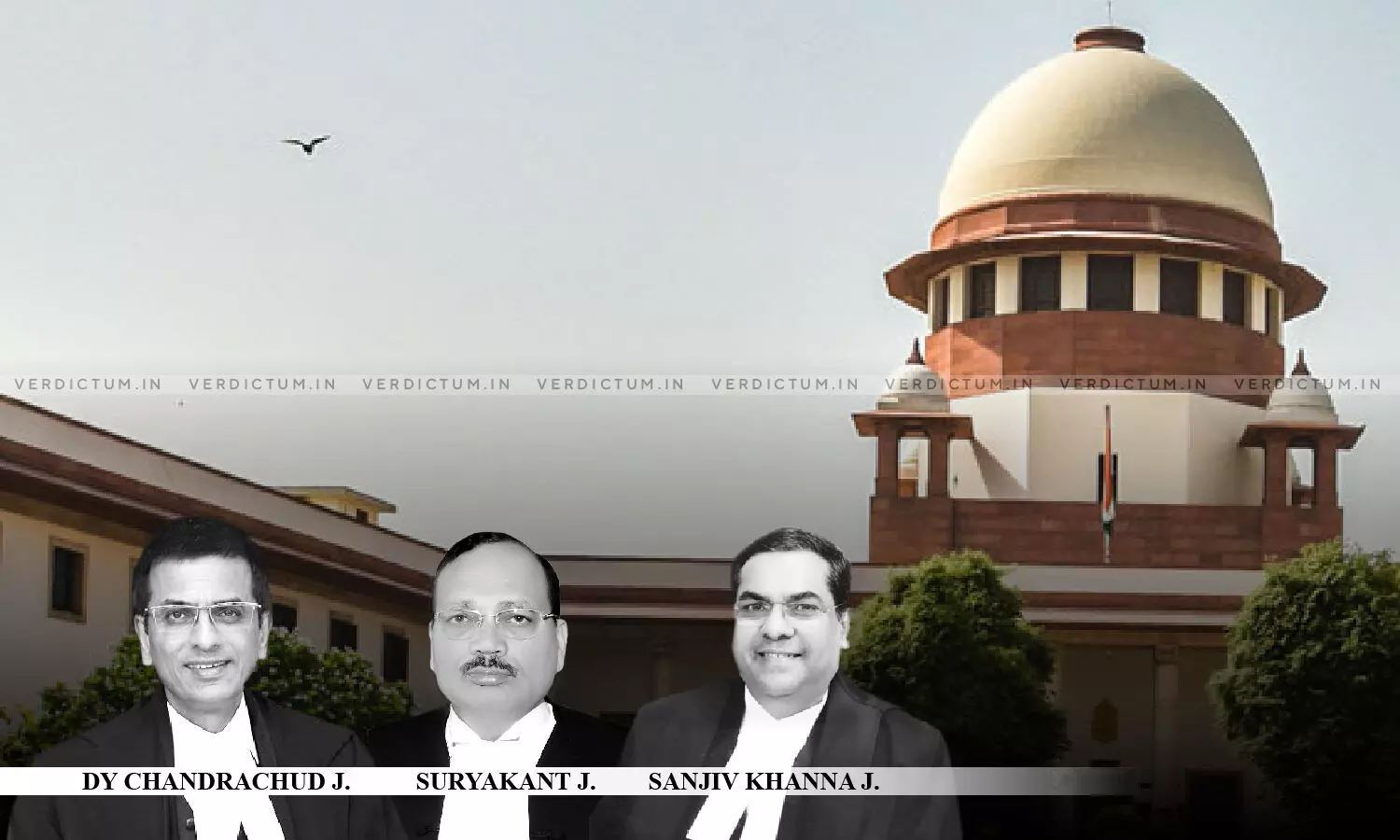
Party Autonomy Backbone Of Arbitration, Arbitrators Cannot Unilaterally Fix Their Fee – Supreme Court
 |
|The Supreme Court in a significant judgment has held that party autonomy is the backbone of Arbitration, this Arbitrators cannot unilaterally fix their fees.
The Bench consisted of Justice DY Chandrachud, Justice Surya Kant, and Justice Sanjiv Khanna; however, Justice Sanjiv Khanna chose to give his analysis separately.
The Bench of Justice DY Chandrachud and Justice Surya Kant observed that the Arbitration Act recognizes the principle of party autonomy and it is also the cardinal principle of Arbitration, in this context, it further noted –
"The Arbitration Act recognises the principle of party autonomy in various provisions. It allows the parties to derogate from the provisions of the Act on certain matters. Several provisions of the Arbitration Act explicitly embody the principle of party autonomy. Section 2(6)107 of the Arbitration Act provides that parties have the freedom to authorise any person, including an arbitral institution, to determine the issue between them. Section 19(2)108 provides that the parties are free to choose the procedure to be followed for the conduct of arbitral proceedings. Section 11(2)109 provides that parties are free to decide on the procedure for the appointment of arbitrators."
The Court further also held that the fee mentioned in the Fourth Schedule of the Arbitration and Conciliation Act 1996 is not mandatory.
The Bench while noting the decision in the case of NHAI v. Gayatri Jhansi Roadways Ltd. and the cardinal principle of party autonomy held the the Fourth Schedule is not mandatory and it is open for the parties to the agreement to specify the fees payable to the Arbitrators.
The Court also held that since most of the High Courts have not framed rules for determining Arbitrators' fees, taking into consideration the Fourth Schedule of the Arbitration Act, the Fourth Schedule is by itself not mandatory on Court appointed Arbitrators in the absence of rule framed by the concerned High Court.
The Court also noted that the Fourth Schedule is not applicable on International Commercial Arbitration and arbitrations where the parties have agreed that the fees are to be determined in accordance with rules of arbitral institutions.
The Bench held that there is no provision in the Act which empowers the Arbitrators to unilaterally issue a binding or enforceable order regarding their fees. Thus, the Court held that it would issue certain directives for fixing of fees in ad hoc arbitrations where arbitrators are appointed by the Courts.
The Court thus held, "…the arbitral tribunal while deciding the allocation of costs under Sections 31(8) read with 31A or advance of costs under Section 38 cannot issue any binding or enforceable orders regarding their own remuneration. This would violate the principle of party autonomy and the doctrine of prohibition of in rem suam decisions which postulates that the arbitrators cannot be the judge of their own claim against parties' regarding their remuneration."
Justice Sanjiv Khanna's separate analysis
Justice Sanjiv Khanna did not agree with the finding that in the absence of any agreement between the parties, or the parties and the arbitral tribunal, or a court order fixing the fee, the arbitral tribunal is not entitled to fix the fee.
Justice Khanna observed, "I am of the opinion that by the implied terms of the contract and as per the provisions of the Arbitration and Conciliation Act, 19961 , an arbitral tribunal can fix a reasonable fee, which an aggrieved party, who is not a signatory to the written agreement, can question under sub-section (3) of Section 39 of the A&C Act during the pendency of the arbitration proceedings, or in case the arbitral tribunal claims lien on the award in terms of sub section (2) to Section 39 of the A&C Act."
"At the same time, I respectfully agree with brother D.Y. Chandrachud, J., that when an arbitral tribunal, even in the absence of consent of the parties, fixes the fee in terms of the Fourth Schedule, the parties should not be permitted to object the fee fixation," the Judge further observed.
Further, Justice Khanna held, "On interpretation of the Fourth Schedule, I respectfully agree with the view expressed by learned D.Y. Chandrachud J. on interpretation of Serial No.6 and that the fee prescribed is for each member of the arbitral tribunal, with a note providing for an additional amount of twenty five percent in case of a sole/single member arbitral tribunal. Even so, on these aspects I would like to give a separate reasoning, as also point anomalies in the Fourth Schedule. However, in my opinion, the expression "sum in dispute" means the sum total of both the claims and counter claims."
In this case, the Arbitration Petition was filed by ONGC arguing that the Arbitrators unilaterally increased the fees during the middle of the hearings.
Attorney General KK Venugopal appeared for ONGC while Senior Advocate Dr. Abhishek Manu Singhvi appeared for the claimant while Senior Advocate Huzefa Ahmadi appeared as Amicus Curiae before the Apex Court.
Cause Title - Oil and Natural Gas Corporation Ltd. v. Afcons Gunanusa JV
Click here to read/download the Judgment